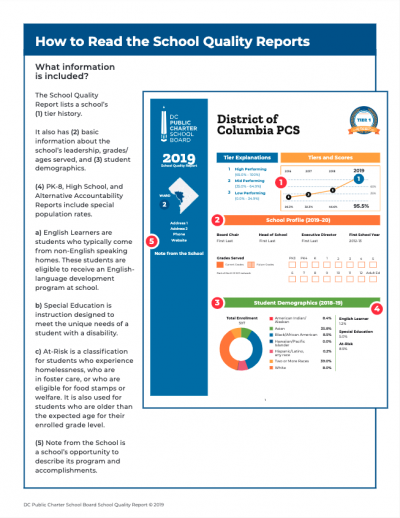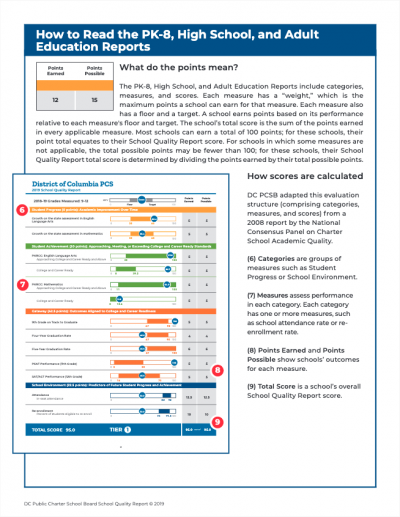School Quality Report Basics
Every year until 2020, the DC Public Charter School Board (DC PCSB) released its School Quality Report, which evaluates all public charter schools in grades prekindergarten (PK) to 12 and adults in Washington, DC.
What is the School Quality Report?
DC PCSB creates the School Quality Report to allow families, school leaders, and other stakeholders to assess performance on several factors, including how well it prepares students for college or the workforce, improves student math and literacy skills, and growth on the state assessment in English language arts and mathematics. It’s our hope current and prospective families use this important tool to evaluate and pick the school that best fits their child’s needs. The report gives each school an overall score and/or a Tier.
What does the score and tier mean?
Schools serving a traditional school-aged population of pre-kindergarten through grade 12 (PK-12) and schools serving adult students will earn an overall score between zero and 100 on the School Quality Report. Every score corresponds to one of three tiers:
- Scores between 65 and 100 are Tier 1. Tier 1 schools meet standards of high performance.
- Scores between 35 and 64.9 are Tier 2. Tier 2 schools fall short of high performance standards but meet minimum overall performance standards.
- Scores lower than 35 are Tier 3. Tier 3 schools fall significantly short of high performance standards, showing inadequate academic performance.
What do we measure for PK-12 schools?
The School Quality Report for PK-12 schools is divided into four categories: Student Progress, Student Achievement, Gateway, and Environment.
The Student Progress and Student Achievement categories measure performance in English language arts (ELA) and Math:
- Student Progress measures student growth in ELA and Math on the PARCC assessment for one or two school years. For schools ending in grades K-3, DC PCSB uses Northwest Evaluation Association Measures of Academic Progress (NWEA MAP) data to report on growth. For schools with students in grades 3-8 or high school, DC PCSB uses PARCC data to report on growth.
- The Student Achievement category shows the percentage of students who are approaching and meeting/exceeding expectations in ELA and math on the PARCC.
The Gateway category displays student outcomes that predict future educational success. In elementary school, students need to be reading on grade level by third grade to be able to access the content in upper elementary school. In middle school, students need to be on grade level in math in eighth grade to have the best opportunities for success in high school. The School Quality Report for high schools includes measures that assess success on the PSAT, SAT, AP assessments, as well as other college and career-ready measures.
The School Quality Report also includes factors that are not based on test scores. The School Environment category includes student attendance and student re-enrollment in the same school. For schools with pre-kindergarten programming, School Environment also includes information on teacher-student interactions in the classroom through the CLASS observation tool measures of Emotional Support, Classroom Organization, and Instructional Support.
What do we measure for adult schools?
The Adult Education School Quality Report measures program effectiveness by tracking student progress, student achievement, progress on mission-specific measures, and leading indicators of attendance and student retention. Each report shows a school's results, including the school's rating in one of three performance tiers.
Using the School Quality Report
Overall, schools’ tier and outcomes on the previously mentioned measures, in addition to visiting a potential school, can help families decide which school is the best fit for their child. Furthermore, the School Quality Report helps school leaders and other stakeholders assess the quality of DC charter schools.
How to Read the School Quality Report


Visit our website to see how your child’s school performed on the 2019 School Quality Report.